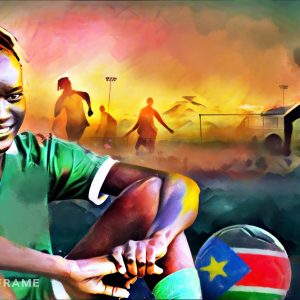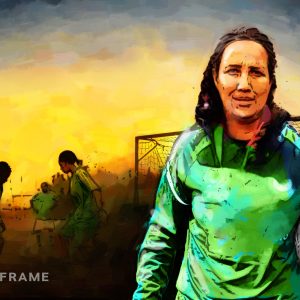How women’s sport can recover from Covid-19 blow
Just as South African women’s sports teams made significant advances, especially in football and cricket, Covid-19 hit, derailing further growth. But there are lessons in the disturbance.
Author:
10 April 2021

Covid-19 hit women’s sport the hardest in South Africa. The notable strides that football, cricket and rugby had made took a knock when the pandemic hit.
Footballers spent 10 inactive months following the suspension of amateur sport, under which falls the Safa National Women’s League. This has had a negative impact on the beautiful game, coming as it did after the 2019 Fifa Women’s World Cup that had a combined viewership of over 1 billion. Banyana Banyana made their debut in the global showpiece, and after it a number of their players went abroad.
The 2020 ICC Women’s T20 Cricket World Cup also raised the bar. A record 86 174 people attended the final match between Australia and India. This was the highest attendance ever for a women’s sporting fixture held in Australia, and the highest attendance for a T20 International cricket match, women’s or men’s, anywhere in the world.
“Women’s sport had positioned itself to capitalise on a bumper 2019 before the coronavirus pandemic struck at the most inopportune moment. 2020 was supposed to be the year when some of that progress was converted into profit; when more valuable media-rights deals should have been signed and further sponsorship monies cashed in,” said communications consultant Marisa Calvert.
Related article:
“Above all else, it was an opportunity to prove that the events of 2019 were not simply a drop in the ocean, but rather the start of something greater for women’s sport, a gaping pocket of the industry that for too long has been little more than an afterthought. Although it all seemed like doom and gloom at the beginning of this pandemic, towards the latter part of 2020, different sponsors came on board and, locally, the women’s sports conversation continued, thanks to publications such as gsport4girls and the work they do.
“A recent Deloitte study showed that women’s sport could recover quite well. However, for women’s sport to succeed in South Africa especially, we must treat it as a separate entity to men’s sport, and not have women’s sport as an afterthought who only comes to the table to eat the crumbs left by the men. They need their own table and their own feast in order to be financially viable.”
Exposing underlying problems
The Springboks women’s team have returned from the sidelines to prepare for the World Cup which has been postponed to next year because of the pandemic.
“Covid has obviously taken its toll on many facets of our lives and, as athletes, our sporting careers were put on hold for a while,” said Springbok prop Babalwa Latsha. “As a lot of female sports are still amateur, it means there has been almost a complete shutdown of activities, which can affect an athlete or a player quite negatively, physically and mentally. But we were given training programmes and assistance where needed to keep going during the lockdown, albeit on our own.”
The effects of the pandemic have not only been financial but also psychological for players. Latsha, who was the first woman in Africa to sign a professional contract when she joined SD Eibar Femenino in Spain, talked about how this period has affected her.
“Some of the personal challenges that I faced during lockdown, was that I had to change my training regime quite a lot, having to adapt and be creative about it. There was a loss of income as well, as was the case for everyone in the rugby industry and many other South Africans. But I decided to control the controllable and tried to move forward as positively as I could,” said Latsha.
Related article:
Banyana goalkeeper Kaylin Swart, who is on the books of JVW FC, lamented how Covid-19 exposed women’s football’s underlying problems.
“These trying times we are in have really shown how much we as female athletes and footballers in general are struggling,” Swart said. “The impact it had on us is so crazy because we have been put in the back seat for so many months. Football is the bread and butter for most of us and during this pandemic we have been struggling and trying everything we can to stay above water. The challenges that I faced was just trying to stay positive and continue to work to stay afloat, also just knowing that through everything, it will work out and we will come out on top.”
The only upside for Latsha is that this period has made her a better player. “I’ve learnt to adapt very quickly; I’ve learnt an elevated sense of professionalism,” she said. “I think I’ve become a better team player, I’m a lot more patient and I have been able to work on and enhance my leadership skills. Over and above that, I’ve also come to understand the gravity of being a professional player and the responsibilities that come with that – it’s something that I embrace.”
Sport psychologist Kirsten van Heerden explained the impact the pandemic has had psychologically on women athletes. “Most elite athletes thrive in a structured environment – and the uncertainty that Covid has caused makes it very hard for them to cope,” she said.
“It was also difficult for athletes to stay motivated to train when they didn’t know when competition would start again… and then when it did begin it was so stop-start, it was tough to stay focused. I have seen a rise in mental health issues in athletes during Covid. This just shows the strain the pandemic has put on them. Although sport is entertainment, people tend to forget that for elite athletes this is their job and many were heavily affected financially.”
Sports bodies step up
Van Heerden, a former athlete herself, added: “Most athletes have not competed for almost a year which is a very unusual situation. Now to start competing again – although they are excited – there are also a lot of nerves. And there is still no certainty around competing so it is difficult to mentally prepare for something that may not happen. Also, getting used to competing under Covid rules is something to get used to.”
South African Football Association (Safa) communications officer Dominic Chimhavi talked about what the governing body did to ease the burden on players. “The Association, among other things, has helped players get a huge relief fund in the form of the Covid-19 relief fund from the national government. On the playing field, the coach and her technical team made sure the players are kept busy by providing them with regular and personal training programmes. She made sure she kept in touch with all the players to hear their concerns. To show that the technical team’s initiatives were a success, it was at the height of the pandemic that most Banyana Banyana players were signed by big overseas teams,” said Chimhavi.
Related article:
“Covid-19 was and is still a global pandemic which took the world by surprise. No one was prepared for it and so it meant readjusting from the past behavioural attitudes to the new norm. As the association, we emphasised the need to collectively do our part to stop the spread of the disease, and for players to listen and adhere to stipulated regulations. This had nothing to do with women athletes but all and sundry.”
SA Rugby echoed Safa’s efforts to meet the athletes halfway. “It was important for SA Rugby to ensure that our women players could continue to train safely as best they could – albeit at home during the national lockdown last year,” said Springbok Women’s high-performance manager Lynne Cantwell.
“Springbok Women head coach Stanley Raubenheimer and his management team stayed in regular contact with the players through online coaching sessions, especially with an eye on the Rugby World Cup initially scheduled to take place in New Zealand this year. In line with this, we assisted a group of players within our larger national training squad financially for a few months, while the players also received weekly training programmes to enable them to keep on top of fitness, recognising that we needed to manage expectations of what was possible during the pandemic. The players’ progress was monitored by the coach and conditioning staff.
Related article:
“With the lockdown restrictions eased in South Africa, we hosted a Springbok Women’s training squad at a two-and-a-half-month training camp in Stellenbosch, where strict Covid-19 safety protocols have been followed.”
The country’s rugby governing body has come away with many lessons from the pandemic, as Cantwell explained:
“I think we learned that online training and contact have lots of benefits, although nothing beats face-to-face contact. It was possible to stay connected to the players, even in the most remote of places. I think we all learned the importance of mental health and using the challenges of Covid-19 uncertainty to learn how to cope and grow stronger as athletes and support staff.
“We learned not to waste time while rugby had stopped, and we used this time to do an enquiry into women’s rugby in South Africa which allowed us to gather insights from the opinions of the players and management about the women’s game. This has helped us better plan what is needed for the future.”




